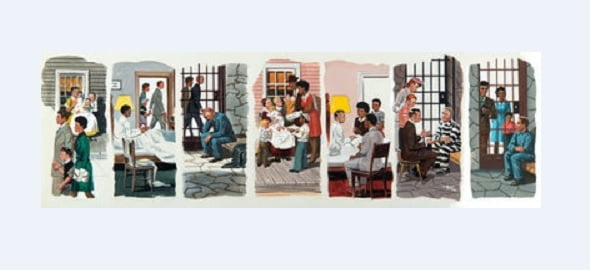Join G. Alexander Bryant and Ted Wilson as they lead the Seventh-day Adventist Church in North America in a season of prayer for the outpouring of the Holy Spirit, in preparation for the Pentecost 2025 Proclamation Initiative. Source: https://www.youtube.com/watch?v=6PanACzha7M
Thursday: You Have Freely Received; Freely Give
Daily Lesson for Thursday 9th of January 2025
Just as the servant could never repay his debt to his master, we can never repay God. We could never earn or merit God’s love. “God demonstrates His own love toward us, in that while we were still sinners, Christ died for us” (Romans 5:8, NKJV). What amazing love! As 1 John 3:1 puts it, “Behold what manner of love the Father has bestowed on us, that we should be called children of God!” (NKJV).
However, what we can and should do is to reflect God’s love to others as much as we possibly can. If we have received such great compassion and forgiveness, how much more should we bestow compassion and forgiveness on others? Recall that the servant forfeited his master’s compassion and forgiveness because he failed to bestow them on his fellow servant. If we truly love God, we will not fail to reflect His love to others.
Read John 15:12, 1 John 3:16, and 1 John 4:7-12. What do these passages teach about the relationship between God’s love, our love for God, and love for others?
Just after John 15:12, Jesus told His disciples, “ ‘You are My friends if you do whatever I command you’ ” (John 15:14, NKJV). And what did Jesus command them? Among other things, Jesus commanded them (and us) to love others even as He loved them. Here and elsewhere, the Lord commands us to love God and to love one another.
In short, we should recognize that we have been forgiven an infinite debt, one that we can never repay, a debt paid only at the cross for us. Therefore, we should love and praise God and live with love and grace toward others. As Luke 7:47 teaches, the one who is forgiven much loves much, but “ ‘to whom little is forgiven, the same loves little’ ” (NKJV). And who among us doesn’t realize just how much he or she has been forgiven?
If to love God entails that we love others, we should with urgency share the message of God’s love, both in word and in deed. We should help people in their daily lives here and now, and also seek to be a conduit of God’s love and point people to the One who offers them the promise of eternal life in a new heaven and a new earth—an entirely new creation from this world, which is so marred and ravaged by sin and death, the doleful fruits of rejecting God’s love.
|
What specific steps can you take to love God by loving others? What could you do today and in the coming days to show people God’s love and (eventually) invite them to enjoy what it means to have the promise of eternal life? |
 (0)
(0)Source: https://ssnet.org/blog/25a-02-you-have-freely-received-freely-give/
Youth Rally 2024
Rivivi i momenti più belli dello Youth Rally 2024, un’esperienza che ha coinvolto tanti giovani a Bari, in Puglia. Source: https://www.youtube.com/watch?v=LiX4g7GwdlM
SATIRE: Grown Adventist Man Demands Medal After Teaching Cradle Roll Sabbath School

Collegedale, Tennessee — Brad Thompson is demanding a medal and formal recognition from his church board after volunteering to teach the Cradle Roll Sabbath School class last week. Thompson, a 42-year-old accountant and father of three, claims his heroic act of leading a group of toddlers through a 30-minute lesson on Noah’s Ark deserves nothing […] Source: https://atoday.org/satire-grown-adventist-man-demands-medal-after-teaching-cradleroll-sabbath-school/
10 giorni di preghiera 2025: Dimorate in me – Giorno 1
Scopri il significato profondo di "Dimorare in Cristo" con il pastore Andrei Cretu. Un invito a iniziare questi 10 giorni di preghiera rafforzando la tua fede. 📖 Trova il materiale di questi giorni speciali su: https://uicca.org/10-giorni-preghiera-2025 Source: https://www.youtube.com/watch?v=tysjCvGLgMg

